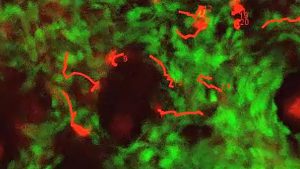- Jan. 15, 2021, 7:30 pm US/Central
- Dr. Thomas Gawski, University of Chicago
- Tickets: $4
- Purchase tickets »
New immune-based therapies for cancer are taking center stage and are revolutionizing cancer treatment. Drugs that “take the brakes” off the immune system (immune checkpoint blockers) have been FDA-approved in 15 distinct cancer entities, and the discoveries leading to those treatments led to the 2018 Nobel Prize in Medicine. More recent strategies to engineer immune cells to specifically recognize and destroy cancer cells have been successful in several different blood-derived cancers. An important aspect of immunotherapy treatments is the duration of clinical benefit—many patients appear to be cured of even the most advanced disease. A tremendous amount of research is being performed aiming to understand how these approaches work when they are successful, and why they fail in a subset of patients and cancer types. Understanding these details is leading to new strategies to expand efficacy further. This lecture will discuss the basic tenets of immunotherapies and touch on the cutting edge of current advances.
Dr. Gajewski directs the Melanoma Oncology Clinic and leads the Immunology and Cancer Program of the University of Chicago Comprehensive Cancer Center. He received his BS, PhD in Immunology, and MD degrees from the University of Chicago, and remained for a residency in Internal Medicine and fellowship in Hematology/Oncology. His PhD mentor was Dr. Frank Fitch, a renowned T cell immunologist, and he went on to do a post-doctoral fellowship at the Ludwig Institute for Cancer Research in Brussels, where he trained with Dr. Thierry Boon for studies in anti-tumor immunity. After returning to Chicago, Dr. Gajewski joined the faculty in 1997.
The focus of Dr. Gajewski’s work has been on understanding fundamental aspects of anti-tumor immunity and bringing these concepts forward from the laboratory into clinical trial testing in patients. While working on melanoma vaccine strategies, his laboratory uncovered a role for downstream resistance pathways allowing tumor evasion from the immune response. Gene expression profiling and IHC approaches have identified the T cell-inflamed and non-T cell-inflamed tumor microenvironment phenotypes. The T cell-inflamed tumors contain tumor antigen-specific T cells but also negative regulatory pathways that have been moved forward as drug targets, including blockade of PD-1/PD-L1 interactions and IDO. Strategies to promote T cell priming and infiltration into non-T cell-inflamed tumors have led to STING pathway agonist development, currently in phase I clinical testing. Genomic characterization of non-T cell-inflamed tumors has revealed oncogene pathways that mediate T cell exclusion, the first of which is the Wnt/b-catenin pathway. Recent work has also identified germline polymorphisms and evidence for commensal microbiota that also regulate anti-tumor immunity, suggesting additional novel ways to facilitate improved immunotherapy outcomes.
Dr. Gajewski has published more than 220 manuscripts and 20 book chapters in these areas, and has presented data at more than 200 scientific conferences. He is past president of the Society for Immunotherapy of Cancer, is founding editor of the Journal for Immunotherapy of Cancer, is past chair of the Cancer Immunopathology and Immunotherapy grant review study section at NIH, has served on the program committees for ASCO and AACR, and is a grant reviewer for the Melanoma Research Alliance and Cancer Research Institute. In 2016 he became the first recipient of the American Cancer Society-Jules L. Plangere Jr. Family Foundation Professorship in Cancer Immunotherapy, and was designated a Distinguished Professor at the University of Chicago. In 2017, he was named the AbbVie Foundation Professor for Cancer Immunotherapy, and received the William B. Coley Award for contributions to the field of cancer immunology. He has had continuous NIH funding for 20 years, and is scientific co-founder of Jounce Therapeutics and Pyxis Oncology.
Photo by Shuyin Li, Gajewski Lab





